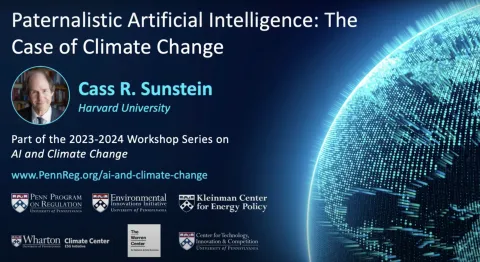
In this workshop organized by the Penn Program on Regulation, Prof. Cass Sunstein, the Robert Walmsley University Professor at Harvard and the founder and director of the Program on Behavioral Economics and Public Policy at Harvard Law, explores the potential of AI-driven “Choice Engines” for helping consumers make decisions that may affect climate change.
The underlying pollution that contributes to climate change is often characterized as an externality because of how private decisions in the marketplace affect others: namely, the welfare of everyone on the planet and members of future generations. Part of the climate problem also derives from inadequate information and behavioral biases, which can produce “internalities,” understood as costs that people impose on their future selves. In these circumstances, the creation of Choice Engines powered by AI might reduce both the internalities and externalities associated with decisions around the use of motor vehicles, appliances, or other products that consume large amounts of (non-renewable) energy. They might also be set up to nudge or require consumers to take these internalities and externalities into account. Prof. Sunstein discusses both the promise and the limitations associated with Choice Engines in reference to climate change to show how AI tools might be used to help consumers address this global problem.
Submitted on Tue, 04/30/2024 - 14:47

